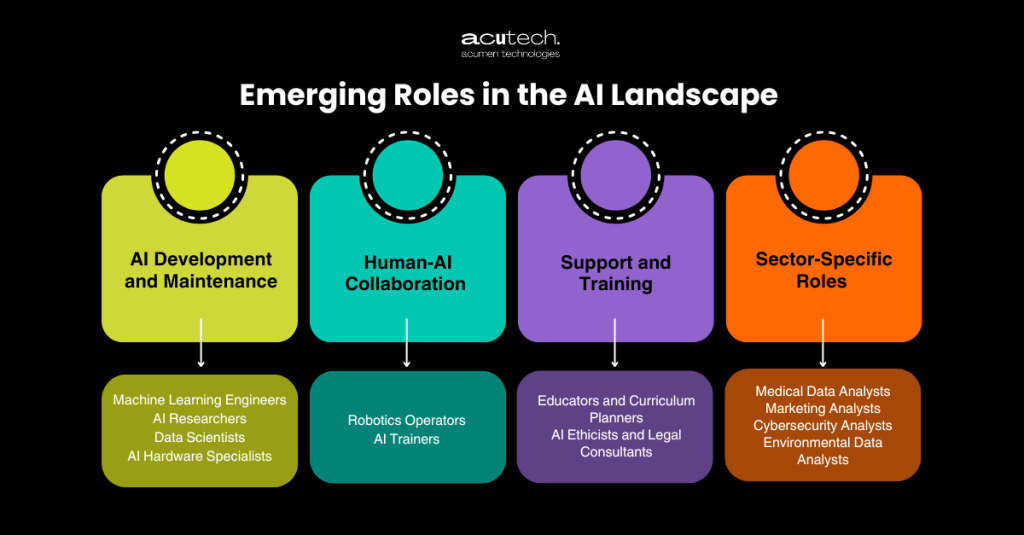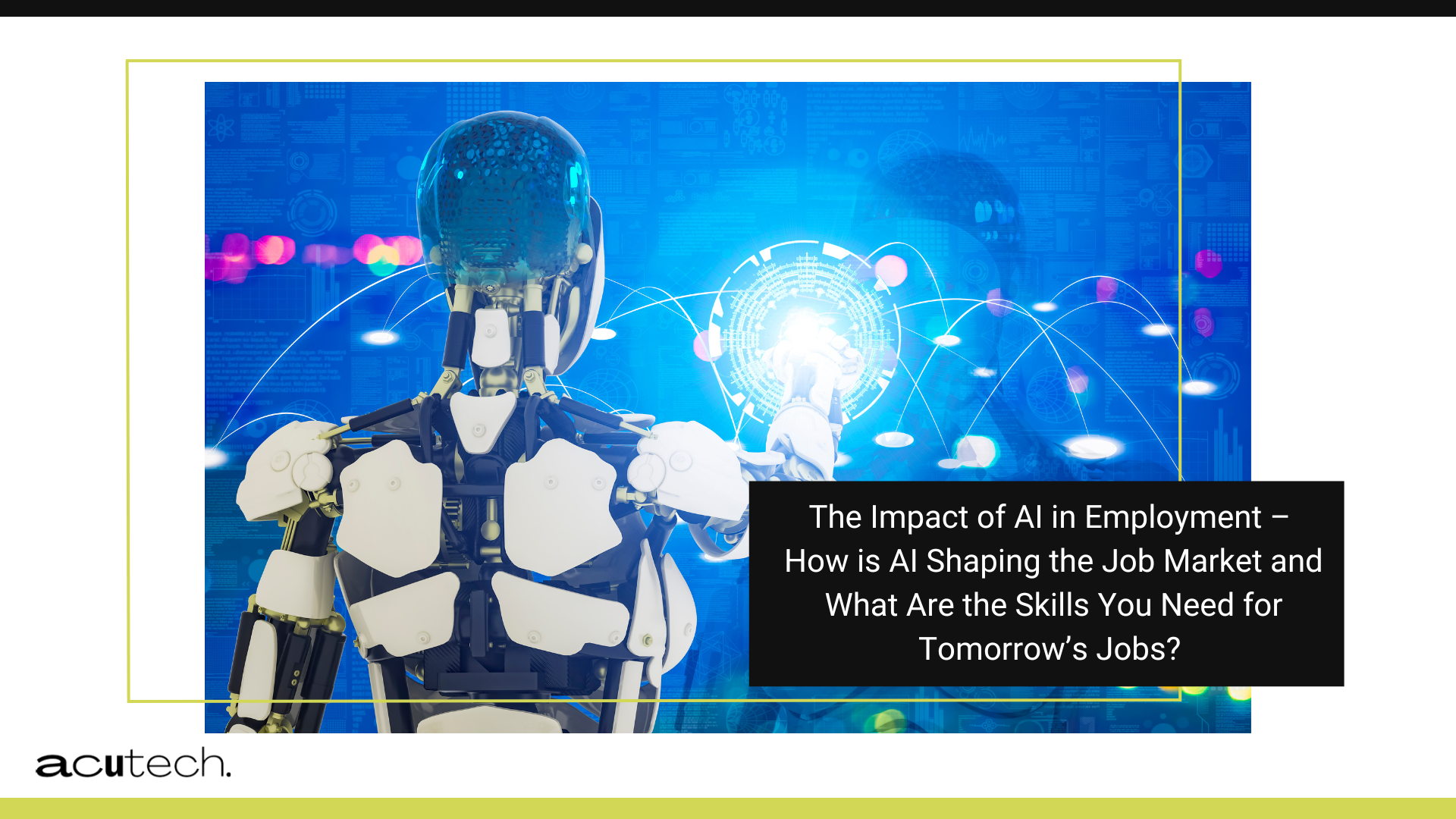Artificial Intelligence is turning the job market upside down, transforming industries, and redefining the nature of work.
While some jobs may become obsolete, new roles are emerging that require skills in AI systems, data analysis, and decision-making.
Stay with us and let’s explore how AI is shaping the job market, the impact on various industries, and how job seekers can adapt to this technological shift.
The Dual Nature of AI in Employment
AI is often perceived as a job killer, but it is more accurate to describe it as a job redefine, since repetitive tasks consume significant time and resources, requiring human intervention prone to errors and inconsistency.
AI, on the other hand, performs these tasks tirelessly and consistently, allowing employees to focus on more complex and creative work. This shift not only enhances productivity but also opens up opportunities for high-value activities.
AI-Driven Automation: The Good and the Bad
AI technologies are automating routine and mundane tasks across various sectors, leading to increased efficiency and productivity. However, this automation also raises concerns about job displacement.
A survey by ResumeBuilder reported that 44% of companies expect layoffs in 2024 due to AI capabilities. Despite this, 83% of respondents believe that AI skills will help employees retain their jobs.
Industries such as manufacturing, transportation, and logistics are seeing significant changes. Assembly line workers, quality assurance inspectors, and machine operators might see a decrease in demand. Similarly, roles like taxi and truck drivers, warehouse workers, and cargo sorters are vulnerable to automation.
In office environments, data entry clerks, basic bookkeepers, and receptionists face the risk of being replaced by automated systems. In sales and customer service, telemarketers and cashiers might decline as AI-driven systems handle inquiries and transactions.
Emerging Roles in the AI Landscape

AI Development and Maintenance
- Machine Learning Engineers: These professionals design and implement machine learning applications, ensuring that AI systems are efficient and effective. They work on algorithms that allow machines to learn and make predictions based on data.
- AI Researchers: These experts push the boundaries of AI capabilities, exploring new methodologies and innovations. They focus on advancing the theoretical aspects of AI, contributing to the development of smarter, more autonomous systems.
- Data Scientists: Data scientists extract insights from complex and unstructured data, helping organizations make data-driven decisions. They use statistical methods and machine learning algorithms to analyze large datasets, uncovering patterns and trends that drive business strategies.
- AI Hardware Specialists: These specialists develop the computational hardware required for AI applications. They design and optimize chips and other components to handle the intensive processing needs of AI algorithms, ensuring that AI systems run smoothly and efficiently.
Human-AI Collaboration
- Robotics Operators: Robotics operators oversee and manage robots in various settings, such as manufacturing, logistics, or medical surgeries. They ensure that robots operate correctly and efficiently, often working alongside these machines to enhance productivity and safety.
- AI Trainers: AI trainers teach AI systems to perform tasks accurately by feeding them data and refining their algorithms. This role is crucial for improving the performance of AI in natural language processing, image recognition, and other domains.
Support and Training
- Educators and Curriculum Planners: As AI becomes more integrated into various fields, there is a growing need for educators who specialize in AI. Such professionals develop and teach curricula that equip students and professionals with the skills needed to work with AI technologies.
- AI Ethicists and Legal Consultants: With AI’s increasing influence, the ethical and legal implications of its deployment are becoming more significant. AI ethicists explore the moral aspects of AI, ensuring that its use aligns with societal values, while legal consultants specialize in navigating the complex legal landscape surrounding AI technologies.
Sector-Specific Roles
- Medical Data Analysts: In healthcare, medical data analysts use AI to analyze medical data, such as MRI images or genomic sequences, to improve patient outcomes. They help in early diagnosis and personalized treatment plans, enhancing the overall quality of healthcare.
- Marketing Analysts: Marketing analysts leverage AI to derive insights from market trends and customer behavior. They use these insights to develop targeted marketing strategies, optimize campaigns, and predict consumer preferences.
- Cybersecurity Analysts: These professionals utilize AI to detect security threats or vulnerabilities. By analyzing patterns and behaviors, they can identify and mitigate potential security breaches before they occur, safeguarding sensitive information.
- Environmental Data Analysts: Environmental data analysts use AI to monitor and analyze climate data, track endangered species, and assess environmental changes. Their work supports efforts in conservation and environmental protection by providing actionable insights based on data.
How to Adapt to Changes Due to AI
Adapting to AI-driven job changes requires both personal and professional development. Here are several ways workers can navigate and thrive in the evolving job landscape:
Lifelong Learning
Embrace continuous learning. The future will favor those adaptable and willing to acquire new skills as AI evolves. Engaging in lifelong learning ensures you stay current with technological advancements and remain competitive in the job market.
Consider taking online courses, attending workshops, or enrolling in certification programs related to your field.
Focus on Soft Skills
AI cannot replicate human emotions, creativity, or complex interactions. Skills like emotional intelligence, leadership, and critical thinking will remain valuable. Cultivating these soft skills can make you indispensable in roles that require human touch, such as team management, customer relations, and creative problem-solving.
Technical Literacy
While not everyone needs to be an AI expert, understanding digital tools and AI principles can be beneficial in many jobs. Gaining technical literacy helps you work more effectively with AI technologies and understand their potential impact on your role. Familiarize yourself with basic AI concepts, data analysis tools, and digital platforms relevant to your industry.
Specialized Training
Consider courses or certifications in emerging AI-related fields like data analysis, machine learning, or AI ethics. Specialized training can provide you with the expertise needed to excel in new job categories created by AI advancements. Many educational institutions and online platforms offer programs tailored to these areas.
Diversify Skills
Build a diverse skill set to adapt to multiple roles. If one job area is impacted by AI, other avenues will be available.
Diversifying your skills makes you more resilient to job market fluctuations. Explore complementary skills that can enhance your primary expertise, such as project management, marketing, or cybersecurity.
Stay Updated
Regularly read industry news and research to anticipate changes and adapt accordingly. Staying informed about technological trends and industry developments enables you to prepare for future job market shifts. Follow reputable sources, join professional forums, and participate in industry conferences.
Flexibility
Be open to changing roles, industries, or locations. Opportunities might arise in unexpected areas. Flexibility allows you to pivot and seize new career paths that emerge as AI transforms various sectors. Consider remote work options, freelance opportunities, or relocating to regions with growing industries.
Seek Mentorship
Find mentors who can guide you through professional changes, offering valuable insights based on their experiences. Mentorship provides support and advice as you navigate the evolving job landscape. Look for mentors within your network, industry associations, or professional development programs.
Engage with AI
Use AI tools related to your job, understand their capabilities, and think about how they can enhance your work. Engaging with AI technologies helps you leverage their potential to improve efficiency and productivity. Experiment with AI applications, attend training sessions, and collaborate with tech-savvy colleagues to integrate AI into your workflow.
Advocacy
Engage with professional associations to ensure workers’ rights and needs are considered as businesses adopt AI. Advocacy ensures that the workforce’s interests are represented in discussions about AI integration. Join unions, participate in industry groups, and contribute to policy-making efforts to shape the future of work.
Entrepreneurial Thinking
AI opens up new business opportunities. Think entrepreneurially to create new services or products leveraging AI. Entrepreneurial thinking encourages innovation and the exploration of new market niches. Consider starting a side project, developing a startup, or partnering with others to bring AI-driven solutions to market.
Where to Go Next in an AI-Dominated Job Market?
The advancement of AI technology poses challenges but also offers countless opportunities. The job market will continue to evolve, with new roles emerging while others fade away. The key for workers and industries is adaptability and a willingness to embrace change.
At AcuTech, we understand and operate with the transformative power of AI and are dedicated to helping businesses and individuals navigate the challenges that rise. With our unique software solutions and cutting-edge technologies, we empower our clients to stay ahead in an AI-driven world.


